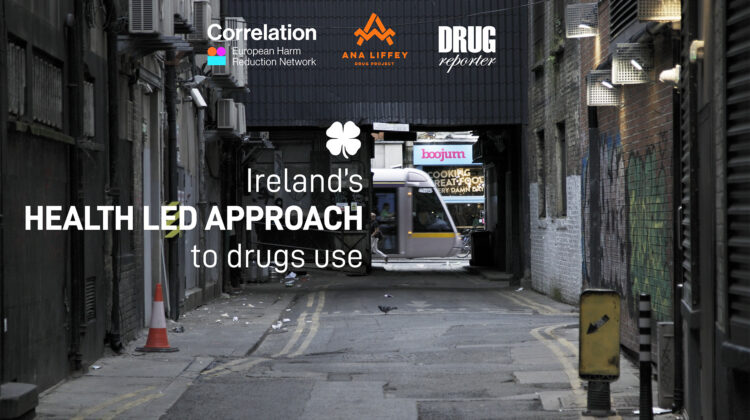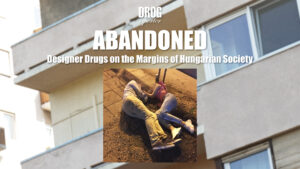Tony Duffin is the CEO of Ana Liffey Drug Project. Established in 1982, Ana Liffey was Ireland’s first service founded on the principles of Harm Reduction. Tony, who has spent decades at the front line of Irelands burgeoning drug problem, has long advocated for progressive and evidence-informed responses to drugs use. Here Tony provides Drug Reporter with a brief reflection on Ireland’s Citizens’ Assembly on Drugs Use. In June 2023, Drugreporter visited Dublin where they interviewed key experts about Ireland’s drug policy developments. You can find a link to the film below!
Recently Ireland’s Citizens’ Assembly on Drugs Use[i] (made up of 100 people, including 99 members of the general public and one independent chairperson) concluded its work. I had the privilege of presenting on two occasions to the Citizens Assembly[ii],[iii]. On the first occasion I brought the ‘The VanaLiffey’ – Ana Liffey’s mobile harm reduction unit – with me, I gave members of the Citizen’s Assembly access to the vehicle and explained the work the team carries out in the mobile unit; and discussed the importance of Harm Reduction, meeting people where they are at and supporting people to meet their self-defined goals.
Through attending, and presenting to, the Citizens’ Assembly on Drugs Use and speaking one-to-one with many members of the group in the back of the mobile harm reduction unit; I got a good insight into the work of the Citizens’ Assembly on Drugs Use. The Citizens’ Assembly members worked hard and were engaged in a subject well known as a complex multifaceted policy topic. Theirs was an unprecedented effort of deliberative democracy by 99 citizens, supported by an independent Chairperson and a government secretariat, to consider the attendant issues related to drugs use in Ireland and to make recommendations to the Government.
Watch Drugreporter’s video on Ireland’s innovative harm reduction tradition, and the country’s steps towards decriminalisation:
On 4th July 2023 Leo Varadkar TD, An Taoiseach (the equivalent of Ireland’s Prime Minister) responded in the Dáil (the lower house of Ireland’s Parliament) to a question seeking commitment towards legislating in relation to the future recommendations of the Citizens Assembly saying:
“When it makes its recommendations, they will be considered by Government in good faith. […] There should not be any assumption or obligation on any democratically elected parliament or government to accept every recommendation that a body makes.”[iv]
Whilst the Government is not obliged to accept the recommendations made, the considerable soft influence of the Citizens Assembly means there will be pressure on the Government to show that they have listened and are acting upon the recommendations in a meaningful way…
A health led approach to drugs use
The recommendations of the Citizens’ Assembly on Drugs Use support a health-led rather than a criminal justice-led response; and recommends that the State go further, than currently planned for in Ireland, by introducing a ‘comprehensive’ health-led response to possession of drugs for personal use (Recommendation 5). My understanding of this is that people would be offered a health referral every time they are found in the possession of drugs for personal use, rather than the one-time currently planned for in Ireland. This reflects a global trend seen in countries like Portugal, which has seen considerable success with decriminalisation and a focus on health interventions for people found in the possession of drugs for personal use.[v]
Greater Political Priority
In the summer of 2017, Ireland launched its current national drug strategy “Reducing Harm, Supporting Recovery: a health led response to drug and alcohol use in Ireland 2017-2025”[vi]. Statutory and Civil Society partners have been working on its implementation ever since. Unfortunately, there have been difficulties with implementing some elements of the national drug strategy in Ireland. A number of key actions have been significantly delayed – specifically the Health Diversion Programme; and the provision of Supervised Injecting Facilities. The Citizens’ Assembly’s emphasis on political attention would help to address this. With suggestions like a Cabinet Committee chaired by the Taoiseach (Recommendation 6) indicating the scale of drug use in Ireland and the urgency needed from top levels of government.
Holistic Strategies and Stakeholder Involvement
The recommendations push for a whole-government and society response, requiring coherence and coordination. Recommendations 13 to 15, for instance, stress the need to hear from those directly affected by drugs, ensuring policies are grounded in lived experiences. This kind of inclusive strategy formulation is more likely to succeed as it encapsulates diverse perspectives.
Funding
The repeated call for more funding (Recommendations 16-19) underscores the current resource gap. Yet, funding alone isn’t the solution; its efficient allocation, tracking, and transparency are equally vital.
Training and Education
The call for training across various sectors (Recommendation 21) is essential. Misunderstanding and misinformation about drug use can reinforce stigma and impede effective interventions. Meanwhile, the focus on preventive education (Recommendation 31) in schools is promising, though its design and implementation require careful thought to be effective and not counterproductive.
Community Involvement and Resilience
Recommendations 25-27, which focus on community responses, are integral. Building resilient communities is a proactive approach, addressing not just the effects but also some root causes of drug addiction.
Harm Reduction and Prevention
The emphasis on measures to reduce the barriers to implementing evidence-based harm-reduction approaches without undue delay is important (Recommendation 28). Harm reduction strategies, like the pilot supervised injection facility in Dublin, which is a priority for the government, must be implemented as a matter of urgency.
Research and Data Collection
The final recommendations about promoting evidence-based innovations and strengthening research (Recommendations 35-36) are crucial. Without rigorous data collection and willingness to innovate, policies can quickly become outdated or ineffective.
In Conclusion
These recommendations reflect a more progressive policy approach to drugs use in Ireland than currently exists. They aim to further shift the narrative around drug use from criminalisation to health and prevention. While they are comprehensive and forward-looking, the true test will be in their implementation. It requires political will, adequate funding, stakeholder engagement, and continuous evaluation and adaptation.
Tony Duffin
Chief Executive Officer
Ana Liffey Drug Project
Interviewees appearing in the film are: Francesca Osborne, Saoirse Aitken, Tony Duffin, Damien Gagnevin, (Ana Liffey Drug Project), Jim Walsh (Drugs Policy and Social Inclusion Unit Department of Health), Andy O’Hara (UISCE Advocacy Service for People who use Drugs in Ireland), Anna Quigley (CityWide Drugs Crisis Campaign), Stacey Lyons (National Voluntary Drug and Alcohol Sector)
The production of the video has been co-funded by the European Union. Views and opinions expressed are however those of the author(s)only and do not necessarily reflect those of the European Union or HaDEA. Neither the European Union nor the granting authority can be held responsible for them.
[i] Citizens’ Assembly on Drugs Use
[ii] Low-threshold services for people with complex needs Tony Duffin, CEO, Ana Liffey Project
[iv] Ceisteanna – Questions – Dáil Éireann (33rd Dáil) – Tuesday, 4 Jul 2023 – Houses of the Oireachtas






